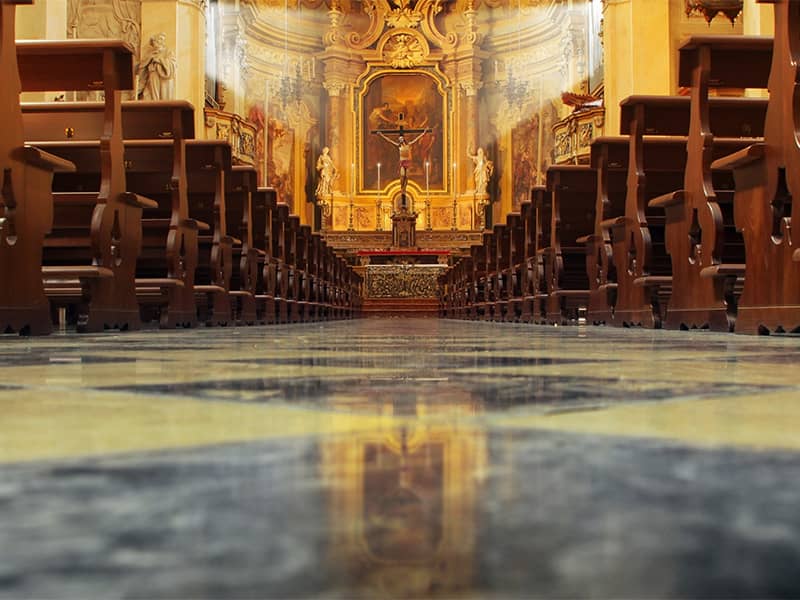But putting the policy into practice is not so simple, particularly because key provisions have not yet been approved by the Vatican. Critics of the new policy say it is vague, Draconian and unenforceable. And some members of the U.S. Conference of Catholic Bishops say they struggle to carry it out. The Rev. Reginald Whitt, a church law expert at the University of St. Thomas in Minneapolis, calls the policy established in Dallas "ugly and vindictive."
The biggest stumbling block--the new policy's requirement that every abusive priest be removed immediately from ministry no matter his age, history or current status--won't pass muster with the Vatican, he says, because it "leaves priests as sitting ducks, easy to victimize or blackmail." In August, the leadership of religious orders, about 30% of U.S. priests, set a sexual abuse policy with more flexibility for retaining priests who can show they have been rehabilitated.
The Rev. Thomas Reese, editor of America magazine, which devotes the next issue to examining the impact of the new policy, is not surprised at the complications. "Imperfect decisions? Mistaken judgments? Welcome to the real world," he says.
Though the victims of abuse held the public's sympathy before Dallas, some concern is now shifting to priests. Priests accused of crimes say the new policy doesn't offer them due process under church law and leaves them with the appearance of guilt in civil court. Admitted abusers who long ago completed treatment and have served in parishes successfully for years or quietly retired cannot act as or call themselves priests--even though this severe new requirement is not yet the law of the church.
Innocent priests fear being railroaded out of their calling based on thin evidence--or none, says Auxiliary Bishop of Brooklyn Joseph Sullivan, who returned from Dallas to remove eight priests from ministry. "My priests' fundamental trust in their bishops is greatly shaken. Now, when you contact a priest for any reason, the reaction is, 'You want to see me? I'm bringing my lawyer.' The new policy changes everything."
Two prominent church officials--Cardinal Roger Mahony of Los Angeles and the chief canon lawyer of Boston--were exonerated after accusers' stories were debunked following months of investigation. Last week, Mahony's accuser was charged with extortion, filing a false police report and other crimes.
In St. Louis, a priest is suing his accuser. The incident in question was so long ago that it fell beyond the statute of limitations, so no charges could be filed. The priest says he's entitled to clear his name; the victim's attorney, Jeff Anderson of St. Paul, calls this, and similar legal counterpunches filed by priests in Ohio and Oklahoma, "a shameful strategy."
Bishops wince when they talk about all the conflicting pressures. "It's been a very painful, very punishing experience for everyone," says Howard Hubbard, bishop of Albany, N.Y., who returned from Dallas to remove six priests from ministry, including four men serving in parishes. Some may appeal under church law's provisions for due process, he says.
The pressure steps up today when arguments start in a Clayton County, Mo., courthouse in a Racketeer Influenced and Corrupt Organization (RICO) case filed by attorney Anderson against former bishop of Palm Beach Anthony O'Connell and the Catholic dioceses of Kansas City, Mo.; West Palm Beach, Fla.; Knoxville, Tenn.; and Jefferson City, Mo.
The suit, filed under a statute usually used to prosecute mobsters, says the bishops conspired to conceal evidence and obstruct justice in the case of a seminary student abused by O'Connell decades ago. O'Connell resigned his post when the case came to light in March. Anderson also has filed a RICO suit against Mahony, including 194 archdiocesan bishops nationwide as unnamed co-conspirators.
Despite the acrimony and confusion, real progress is being made in many areas called for by the Dallas policy, says bishops conference spokesman Monsignor Francis Maniscalco. He cites the establishment of lay-led review boards and of victims' outreach coordinators in most dioceses, plus new efforts to prevent future abuses. "People see we are taking action to put children first," Maniscalco says. Bishops won't be off the hook with the priests or the public "until we see some resignations by leadership," Sullivan says.
Those church leaders such as Cardinal Bernard Law of Boston who retained or reassigned abusive priests are still in place. Even Law's resignation might not be enough, Sullivan says. "If you took all the bishops in Dallas and put them on a stage and shot them all, it wouldn't satisfy some people."

